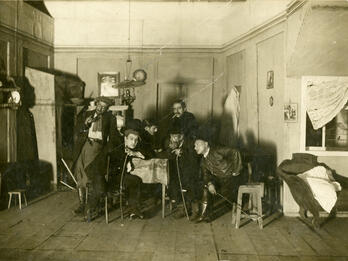Joseph the Righteous
Makhlouf Nadjar
1913
I will leave him in prison now
[for] he has committed a great sin.
May he taste the recompense of his evil deed there
and may this wicked man die.
[They take Yosef and she remains perplexed and at a loss, then says]
Bring him back! For my heart
has melted from my passion for him.
Perhaps he will accept my love
and acquiesce to my inclination…
The language in this popular drama is quite different from Nadjar’s poetry: it is more formal and bears fewer of the characteristic features of the Tunisian dialect of Judeo-Arabic. The author was clearly acquainted with the classics of medieval Arabic literature and likely had in mind an audience that included Muslims in addition to Jews. Thus, certain phrasing nods to the language employed in the Quran, and in particularly its telling of this story, and the poetic portions of the dialogue quote the classical Arabic poet of the Abbasid era al-Mutanabbi and The Thousand and One Nights. Much of this selection is written in rhymed verse. Of what is not in verse, much is in the sajʿ, the rhymed prose often employed in medieval Arabic literature.
Creator Bio
Makhlouf Nadjar
Born in Moknine in eastern Tunisia, Nadjar (alt. Makhlūf Najjār) moved to Sousse at the age of thirteen and began his career as a theatrical director and actor, performing in Hebrew, Arabic, and French. In 1917, Nadjar purchased the press and printing equipment of Tsemaḥ ha-Levi, a pioneer of Tunisian Judeo-Arabic literature, and began printing and distributing Judeo-Arabic books. In addition to publishing works of his own composition or translation and the works of his contemporaries, Nadjar republished many works of North African Judeo-Arabic literature from the late nineteenth century. Starting in 1920 he served as the editor for the Judeo-Arabic and French weekly al-Nijma (L’Étoile, or “The Star”), which he published until 1961.
You may also like
Rigoletto in Yiddish: A Notable Triumph
Letter to Jacob Dinezon

Home Again

Esther Play for Purim

The Double Accountant



